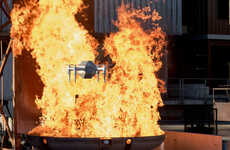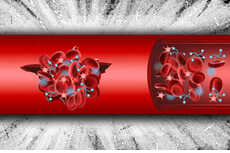This New Jet Fuel Helps Reduce the Intensity of Post-Crash Fires
Rahul Kalvapalle — October 7, 2015 — Tech
References: caltech.edu & gizmag
A group of scientists and researchers at the California Institute of Technology have developed an innovative and high-tech additive, designed for jet fuels, that helps reduce the intensity of fuel fires that can occur in the aftermath of a plane crash.
It turns out that surviving through an airplane crash means way more than just surviving the initial impact -- many people tend to be killed by the flames and smoke that follow when the jet fuel catches fire, causing massive explosions that are difficult to survive. However, it is hoped that this new jet fuel additive will help reduce the intensity of those explosions.
This jet fuel additive is based on a special polymer that helps get around the problem of the creation of easily combustible mist that is formed in jet engines. The researchers next step is to work on "creating a reactor that could produce commercial-scale quantities of the polymer."
Once this happens, we might finally be able to enjoy safer and more explosion-proof jet fuels on a commercial scale.
It turns out that surviving through an airplane crash means way more than just surviving the initial impact -- many people tend to be killed by the flames and smoke that follow when the jet fuel catches fire, causing massive explosions that are difficult to survive. However, it is hoped that this new jet fuel additive will help reduce the intensity of those explosions.
This jet fuel additive is based on a special polymer that helps get around the problem of the creation of easily combustible mist that is formed in jet engines. The researchers next step is to work on "creating a reactor that could produce commercial-scale quantities of the polymer."
Once this happens, we might finally be able to enjoy safer and more explosion-proof jet fuels on a commercial scale.
Trend Themes
1. Explosion-proof Jet Fuels - The development of high-tech additives that helps reduce explosion intensity can be applied to other industries with flammable materials.
2. Polymer-based Additive Innovation - The use of polymers to create innovative, non-combustible additives presents an opportunity for industries to increase safety and reduce the risks of accidents.
3. Commercial-scale Production of Jet Fuel - The creation of a reactor that produces commercial-scale quantities of the polymer can create new cost-effective opportunities for producing jet fuel and other materials with increased safety features.
Industry Implications
1. Aviation Industry - The aviation industry can adopt the use of high-tech jet fuel additives to improve safety and reduce risks of fatalities caused by post-crash fires.
2. Petrochemical Industry - The use of polymer-based additives to increase safety standards in the production and handling of combustible materials can bring disruptive innovations that could potentially save lives.
3. Chemical Industry - The development of a reactor that can produce commercial-scale quantities of polymers presents an opportunity for the chemical industry to produce additives with an increased level of safety for various applications.
2.3
Score
Popularity
Activity
Freshness






















